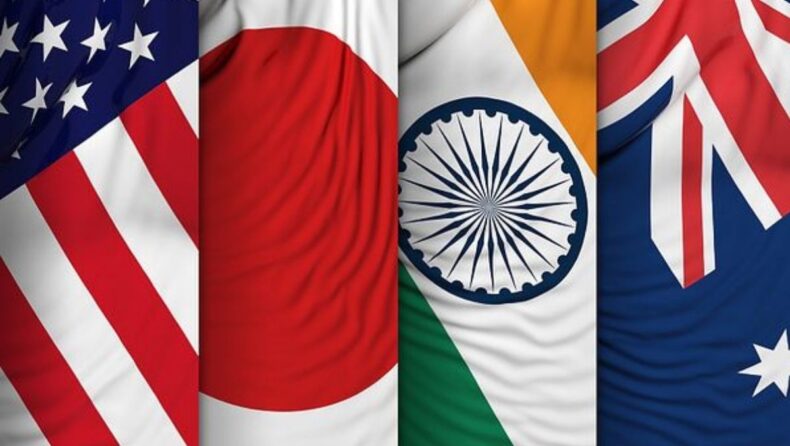Leaders of the US, Japan, India and Australia unveil the Indo-Pacific maritime surveillance plan and pledge $50bn in infrastructure investment in a bid to counter China.
US, Japanese, Indian, and Australian leaders announced a maritime initiative to combat illegal fishing and a commitment to invest more than $50bn in infrastructure development to counter China’s growth in the region. “At the Tokyo summit”
On Tuesday, the four men announced the pledges during the second in-person summit of their Indo-Pacific Quad grouping. The meeting of the informal alliance, which was created to counter China’s economic and military might, also discussed climate change, technology and COVID-19, along with the fallout of Russia’s invasion of Ukraine. This issue has risked division among the group. Only India has yet to condemn Moscow’s war despite its close relations with Moscow. “At the Tokyo summit “.
President Joe Biden, Prime Minister Fumio Kishida, Prime Minister Narendra Modi and Australia’s new leader Anthony Albanese hailed the Quad’s latest measures as showing it is “a force for good” and “dedicated to bringing benefits to the region” at a time of profound global challenges.

Although China was not mentioned by name, the leaders said they were opposed to “coercive, provocative, or unilateral actions” that would change the status quo in the Indo-Pacific. China has been accused of “militarising disputed islands, using dangerous coast guard vessels and maritime militias, and interfering with other countries’ offshore resource exploitation activities” – all accusations that have been levelled at it.
In response to these concerns, the Quad announced a new maritime surveillance initiative, the Indo-Pacific Partnership for Maritime Domain Awareness (IPMDA), which will work with regional partners to respond to humanitarian and natural disasters and combat illegal fishing. “At the Tokyo summit”
The IPMDA will support and collaborate with Indo-Pacific nations and information fusion centres in the Indian Ocean, Southeast Asia, and the Pacific Islands by supplying technology and training for enhanced, shared maritime domain awareness to promote continued prosperity in our seas and oceans, according to the statement.
Also, the leaders emphasised the importance of deepening cooperation on infrastructure, noting that such investment is critical to driving productivity and prosperity in the Indo-Pacific region.
The Indo-Pacific will receive more than $50 billion in infrastructure assistance and investment to address debt issues over the next five years. In addition, they pledged further assistance for island nations in the Pacific, where China’s influence has grown in recent years. “At the Tokyo summit”.
DARK HOUR
Quad leaders also discussed the war in Ukraine while reaffirming their commitment to “uphold an international rules-based order where countries are free from all forms of military, economic, and political coercion”. While their statement did not mention Russia by name, it did say the leaders discussed the “tragic” conflict in Ukraine and stressed the importance of “respecting the sovereignty and territorial integrity of all states”.
According to Biden, the significance of attaining the goals of the Quad – a free, open, connected, and secure Indo-Pacific – has been reinforced by the conflict between Russia and Ukraine. “We are navigating a dark hour in our shared history,” said the US president. “The Russian brutal and unprovoked war against Ukraine has triggered a humanitarian catastrophe … This is more than just a European issue. It’s a global issue.”

He later addressed the conflict in a bilateral meeting with Modi. As reported by the White House, Biden “condemned Russia’s unjustifiable war against Ukraine”, adding that the two leaders discussed humanitarian aid and methods for managing disruptions caused by the conflict. In its readout, India made no mention of Ukraine or Russia.
A spokesman for the Indian foreign ministry said Biden and Modi “discussed ways to strengthen cooperation in trade, investment, technology, defence” and that their meeting had “concluded with substantive outcomes adding depth and momentum to the bilateral partnership”.
https://twitter.com/MEAIndia/status/1528985280702603264?ref_src=twsrc%5Etfw%7Ctwcamp%5Etweetembed%7Ctwterm%5E1528985460550184961%7Ctwgr%5E%7Ctwcon%5Es2_&ref_url=https%3A%2F%2Fwww.aljazeera.com%2Fnews%2F2022%2F5%2F24%2Fquad-leaders-meet-in-japan-to-discuss-china-russia-tensions
Following his meeting with Modi, Biden also met with Australia’s new prime minister, who just assumed his post on Monday after his party won the election last weekend. From the White House, a readout of their meeting said both leaders agreed that events such as Russia’s invasion of Ukraine must not happen in the Indo-Pacific.
Although Australia’s government has changed, Albanese has said that the country remains committed to the Quad. He added his priorities aligned with the group’s agenda. He said he looked forward to taking on the “biggest challenges of our time, including climate change and regional security”.
Despite its focus on the Russian war in Ukraine, the Quad summit took place on Biden’s final day of a five-day trip to Asia, which aimed to reassure allies that the US remains committed to countering China.
Quadrilateral cooperation is a crucial part of the US’s “free and open” Indo-Pacific strategy.
Established in the wake of the 2004 Indian Ocean tsunami to coordinate humanitarian assistance, the group has evolved into what the United States calls a “leading regional partnership”. Since its revival in 2017, the group has stepped up joint military exercises. Last year, it established six leaders-level working groups on the COVID-19 pandemic, climate change, technology, cybersecurity, space and infrastructure.

“In a short time, we’ve shown the Quad isn’t just a fad,” Biden said at the start of Tuesday’s summit. “We mean business.”
read more:-https://tdznkwjt9mxt6p1p8657.cleaver.live/joe-bidenwarnsdarkhour-ukraine/













